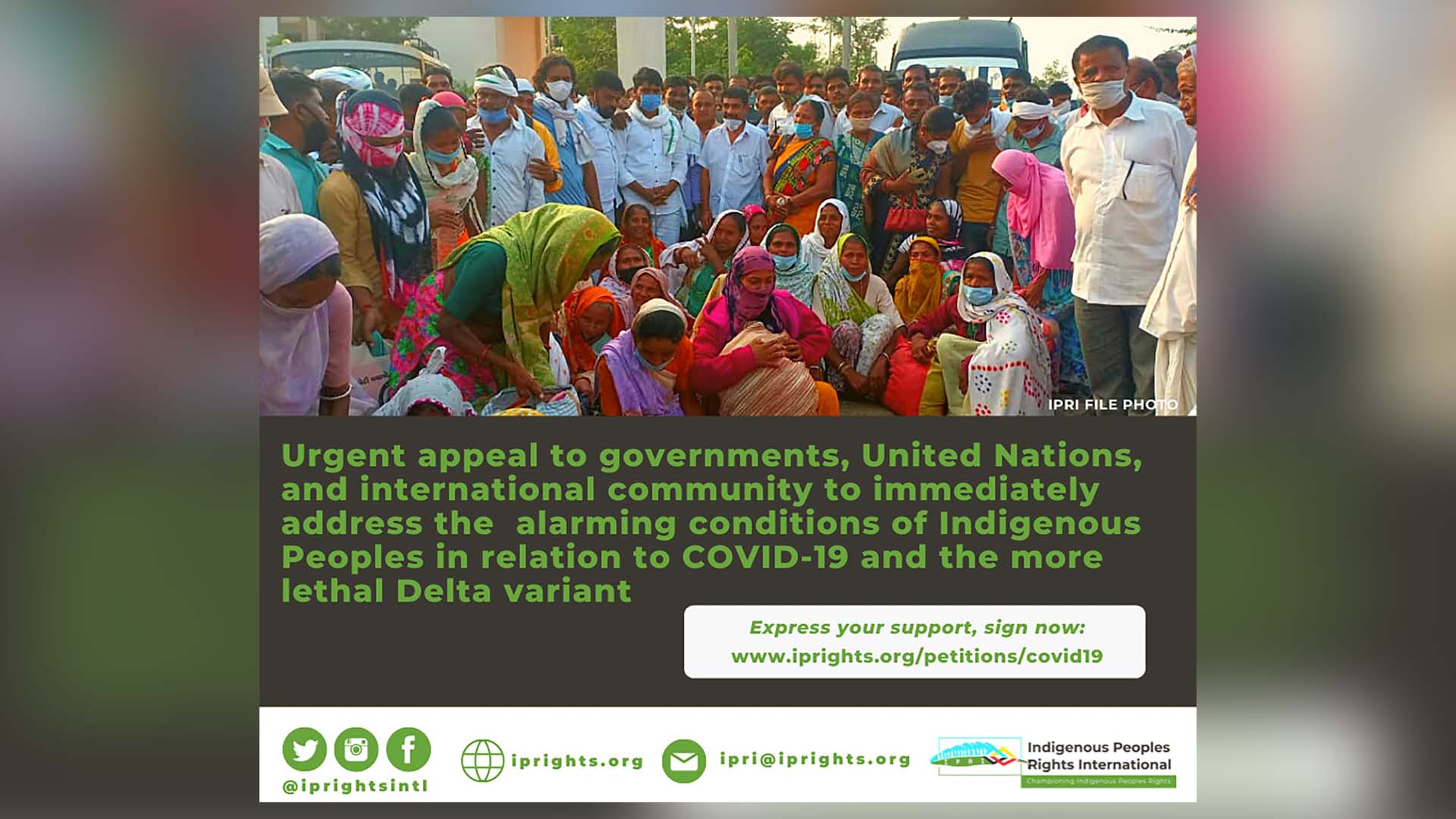We, Indigenous Peoples, and the wider civil society, call on governments, the United Nations, and the international community to urgently heed the global and persistent call for an immediate, adequate and culturally-appropriate response to help Indigenous Peoples communities in the time of this COVID-19 pandemic. The pandemic has disproportionately affected Indigenous Peoples and is exacerbating the underlying structural inequalities and discrimination against them.
The UN Special Rapporteur on the Rights of Indigenous Peoples reported in 2020 that “In the COVID-19 pandemic, Indigenous Peoples have already reported alarming levels of transmission among their communities and sometimes higher rates of fatalities.”[1] The onslaught of the Delta variant has severely aggravated the situation of Indigenous Peoples, and has not spared even those communities that have effectively employed traditional measures to prevent or adequately address the pandemic. Indigenous Peoples now intensely fear for their lives as their traditional systems are proving insufficient to combat the ferocity of the lethal Delta variant in addition the negative impacts of restrictions and other discriminatory measures. Indigenous Peoples, especially the younger generation, are dying at an alarming rate due to the Delta variant. “Our younger generations are dying, especially with the Delta variant. Some of our communities do not have any access to vaccines or health care, and some have zero knowledge about the virus, and how to address it”, said Rukka Sombolinggi, an indigenous person from Indonesia.
The Indigenous Peoples Rights International (IPRI) gathered information that show discriminatory and culturally-insensitive measures of some governments in the roll out of vaccines and medical assistance. For instance, vaccine rollout prioritizes people with comorbidity who can show medical certificate, and requires identification cards. Some indigenous communities, who have no access to medical services, have no means of knowing, much more proving that they have comorbidities. Some indigenous persons do not have identification cards, as in fact, some communities are denied of registration and citizenship as in the case of around 100,000 Indigenous Peoples in Thailand, near the border with Myanmar. Many Indigenous Peoples in countries across the globe do not even have birth certificates. Some communities have no or minimal knowledge about the virus and how to address it.
Even in first world countries like Australia, indigenous communities far from urban populations, were not spared from the pandemic and are facing serious concerns about access to medical intervention. In Walgett, Australia where a recent virus outbreak occurred, the hospital has no intensive care unit, and seriously ill patients have to be flown for three (3) hours by helicopter to another city.
The harrowing situation of Indigenous Peoples in this pandemic is continuing despite international polices to provide urgent and specific attention to populations experiencing the highest degree of socio-economic marginalization like Indigenous Peoples. The UN Framework for the immediate socioeconomic response to COVID-19 identifies Indigenous Peoples as among the populations that must be reached for immediate development response so that they will not be further left behind. “The Office of the United Nations Commissioner for Human Rights (OHCHR) and the Food and Agriculture Organization of the United Nations (FAO) have issued recommendations specifically applicable to indigenous peoples during and in the aftermath of the pandemic. The International Labour Organization (ILO) issued a policy brief and the Inter-Agency Support Group on Indigenous Peoples’ Issues published a guidance note for the United Nations system. The Inter-American Commission on Human Rights adopted a resolution on human rights and the pandemic, including recommendations to protect indigenous peoples’ rights. … The Working Group on Indigenous Populations/ Communities in Africa of the African Commission on Human and Peoples’ Rights issued recommendations related to access to health services, water and sanitation and urged States to take into account indigenous peoples’ way of life in all decisions taken for the prevention of COVID-19. The Organization for Security and Cooperation in Europe issued a set of recommendations on short-term responses to COVID-19 that support social cohesion.”[2]
International groups and personalities have called out governments to adopt culturally appropriate measures, and immediately respond to Indigenous Peoples difficulties and challenges resulting from the COVID-19. “The Organization of American States (OAS) General Secretariat urged member States to generate specific programmes and policies to sustain the economies of their indigenous communities and dedicated parts of its Practical Guide to Inclusive and Rights-Based Responses to COVID-19 in the Americas to the need for a differentiated response for indigenous peoples.”[3] UNFAO urged “governments, academia, NGOs, international community and indigenous peoples authorities to take specific measures that ensure the respect to indigenous peoples’ rights during the pandemic and that includes an intercultural approach when dealing with the emergency, safety and health aspects of the response.” In a Statement released by the Chairperson of the UN Permanent, Forum on Indigenous Issues (UNPFII), Anne Nuorgam, she underscored the urgency for States to address the vulnerable situation of Indigenous Peoples - “We urge Member States and the international community to include the specific needs and priorities of indigenous peoples in addressing the global outbreak of COVID 19.“
However, governments’ response and overall assistance to Indigenous Peoples have been generally limited if not totally absent, and culturally insensitive. Governments are still “failing to adopt specific policies and at times neglecting even to include indigenous peoples in general COVID-19 responses”.[4]
In light of this, we renew, and amplify the URGENT call to governments, the United Nations, and the international community for an IMMEDIATE, ADEQUATE, AND CULTURALLY-APPROPRIATE response to the pandemic for all Indigenous Peoples worldwide, while supporting traditional community measures to complement modern scientific methods in addressing the COVID-19 disease.
It should not be ignored that Indigenous Peoples have the right to the enjoyment of the highest attainable standard of physical and mental health without discrimination (ICESCR, Art. 12), and the right, without discrimination, to the improvement of their economic and social conditions, including health and social security (UNDRIP, Article 21). Additionally, ensuring that Indigenous Peoples are not left behind is indispensable to the attainment of the world’s sustainable development goals.


%2020.49.20.png)
